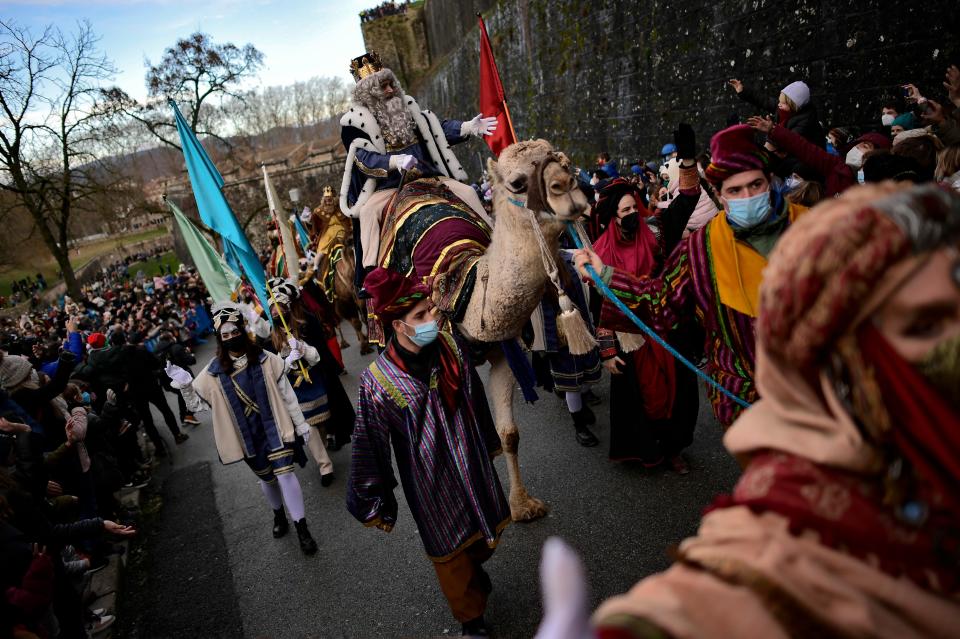Three Kings Day or Epiphany? What these two holidays celebrate and have in common
Corrections and clarifications: A section of this story was removed after the identity of a source could not be verified. Separately, another section of this story describing the different commemorations was incorrectly attributed. That has since been corrected.
In Jazmin Fargas' household, Three Kings Day calls for family dinners, grama or grass underneath the pillow, sweet treats and extra gifts from the three wise men who visited baby Jesus.
Jan. 6 marks Three Kings Day, a holiday celebrated in most Latin American and Caribbean countries. The holiday is associated with the traditional Christian feast day of Epiphany when the three wise men brought gifts to the baby Jesus, according to the Biblical nativity story.
The holiday is loaded with customs such as leaving grass or hay out for the three kings in exchange for a gift. In Mexico, the holiday wouldn't be complete with a Rosca de Reyes, a large oval-shaped bread with dried fruit decorations.
But what are the origins of the two holidays, how are they celebrated and what do they have in common?
Nochebuena: Why many Hispanic, Latinx and Filipino families celebrate Christmas on Christmas Eve
Mexican Independence Day: How September 16 signifies a 'moment of hope' for Mexico
Who celebrates Three Kings Day and why does it matter?
Venezuela, Colombia, Dominican Republic, Argentina, Mexico, Uruguay, Puerto Rico, Paraguay and Cuba are among the Latin American and Caribbean countries that celebrate this holiday. In the U.S., many Latinx and Hispanic communities commemorate Three Kings Day as a way to honor their own cultures and customs.
Fernando Laspina, runs El Maestro, a nonprofit educational center in the Bronx, New York. Laspina said Three Kings Day is widely known and prioritized as the "second Christmas" for the Latinx community.
"It is no joke. We celebrate it just as much as Christmas, it's another opportunity to be with family, food and gifts, which are three things we love," Laspina told USA TODAY.

Since she was little, Fargas said her parents would save their pennies to make sure she had presents on Christmas Day and on Jan. 6. Both deeply religious holidays held a special place in her household.
It's a holiday centered around time to reflect on family and faith and the hope that baby Jesus represents, Fargas said.
Latinx families don't believe the holidays are "officially over" until the three wise men are celebrated, Laspina added.
"There's Nochebuena, New Years and then Three Kings Day. That's when the decorations come down and the partying stops. But first, we thank and celebrate the three men who found baby Jesus," Laspina said.
How is Three Kings Day celebrated?
Since the holiday is celebrated in dozens of countries, it holds distinct traditions in each one. In Mexico, the staple dish is Rosca de Reyes, a bread with a baby Jesus figurine inside. Each person present will cut their own piece out of the bread, and if you get the baby Jesus, "the tamalada is on you," Fargas said.
"Basically if you get the baby Jesus that means the next party, which is Feb. 2, the Día de la Candelaria, will be at your house," Fargas said.
On Jan. 5, known as Víspera de Reyes or Three Kings Eve, Keishla Estrada's children place a small bag filled with grass underneath their pillows as a snack for the wise men's camels. The next day, her kids awake to a small gift underneath their pillow.
In Spain, instead of grass, children place a small shoe underneath their pillow with a note of what gifts they'd like to receive. The next morning, they wake up to gifts from the wise men.

Estrada reads Bible stories about how the three kings made their way to baby Jesus' manger in Bethlehem, and they top off the night with traditional Puerto Rican food such as arroz con gandules, tembleque and more. On the island, festivals, parades and family dinners have been a long-held tradition.
"It's just as special and magical as Christmas is. It's fun, it's exciting, it's religious and deeply rooted in my culture. We celebrate because we're grateful," Estrada said.
Are Epiphany and Three Kings Day the same holiday?
Yes and no. Three Kings Day originated from the celebration of the longstanding religious holiday Epiphany.
In the Western church, Epiphany mostly commemorates the visit of the Magi to the infant Jesus while in the Eastern church, the festival primarily celebrates the baptism of Jesus and the revelation that Christ was both fully God and fully man, according to Newsweek.
In some cultures and countries, Three Kings Day is primarily also known by the name Epiphany. While Three Kings Day is celebrated for just one day, Epiphany is celebrated for days or weeks depending on the culture.
Follow Gabriela Miranda on Twitter: @itsgabbymiranda
This article originally appeared on USA TODAY: Three Kings Day: Why many families call the holiday 'Second Christmas'

